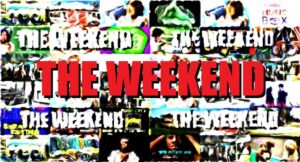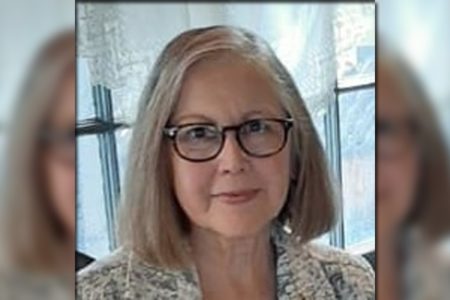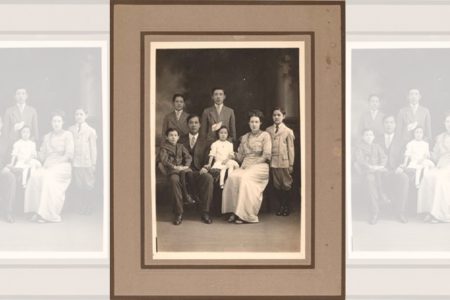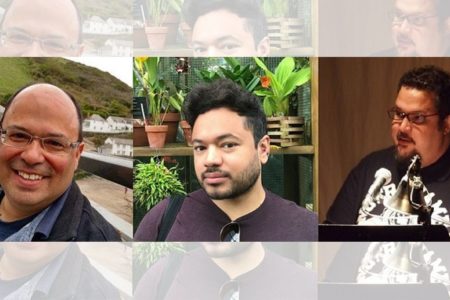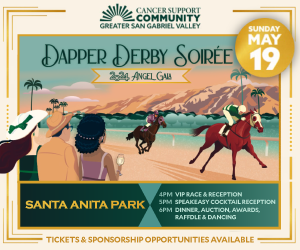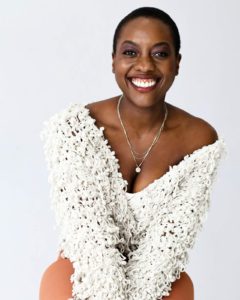
Adobuere Ebiama
“The black woman IS because she IS
not because we need her to be.”
— Adobuere Ebiama, How Far?
Before the end of 2020, Adobuere Ebiama’s new book How Far? could be sitting on your shelf. A collection of lyrical essays and poetry inspired by the author’s first trip to Nigeria, How Far? begs the reader to sit with the themes of identity and home and wrestle with how these concepts shape who we are. Author Adobuere Ebiama is an award-winning multidisciplinary artist and How Far? is Pronto’s forthcoming third release following my own Black Was Not A Label and Jonathan Ezequiel Donabo’s Nolan.
I got to catch up with Adobuere to learn more about this fantastic work and ask some questions on how How Far? came to be.
Hi Adobuere! How Far? is your first book! Congratulations! As an artist of many trades, how was it writing a book? Was the process an experience you expected, or was it something that surprised you as you went along?
I wasn’t sure what to expect because when I started writing I didn’t think I was going to be putting together a book. I was just reflecting on my own experiences to process them for myself. After I decided to make it a book, I slowly came to understand that you cannot stay on the surface of the work and be vague or one note about your very real experiences when you intend to share them with other people.
Experiences are never really one note and if you do stay vague, then your intention with the work will not be clear. After my first revision with the editor I realized that what I wanted to say and what I was actually saying were not really coinciding. That was tough because at first I really thought that it was very clear. Well, it was clear to me. But then the editor was probing me, asking, “what does this mean?” or “what do you mean by this?” and then I had to really get past the coddling of my own emotions about it and release them to get to the real truth of whatI want to say. I had to dig deeper and be very honest about things that I was still processing if I was serious about sharing those ideas with the world. It reminds me of something from my acting studies—this concept that, “just because you’re feeling something as the actor on stage, it does not mean that the audience will also feel it.” Finding a way to use all the tools in your arsenal to translate what it is that you want to emote is the tough stuff. I am usually on the side of translating someone else’s words through the character when I am acting. The importance of clarity and directness has been something relevant to me for sure but this time around, it was different. It may sound simple but I think it is easier said than done.
How Far? is inspired by your first trip to Nigeria. Can you tell me a little about how you settled on this title? It connotes a feeling of fatigue and longing for home, but you mention how Nigeria doesn’t feel like home and isn’t home like America (namely Boston) is. Is the title related solely to the distance between America and Nigeria or is there another meaning to this question-turned-title?
To me, How Far? holds a lot of meaning even though it is such a simple phrase. When I was first asked the question while in Nigeria, I was like “Huh? What is this person asking me?”
When I first started writing my reflections from the trip I knew that exploring identity was a major theme. It was really kind of impossible for it not to be. Spending two and a half weeks in Nigeria was definitely a major chapter in my journey of self discovery.
I think about the distances that people go to in order to get closer to themselves; to understand who they are, to understand the people and the world around them. We adopt spiritual practices, religions, we go to therapy, read self help books, and we travel to foreign countries with these longings to get to a deeper meaning and to know what is beyond the surface of it all. For the book and the title I found it appropriate to have those simple two words pose the question: how are you doing on your journey with your self?
In your book, you explore a number of themes such as identity, sexuality, and familial ties. Namely, the tension between being American vs Nigerian, “Gay” vs the more fluid “Queer,” and being a family member welcomed to a home that doesn’t really feel like home. How do these themes intersect within you personally and how do you want your readers to receive your words? Is there one main thing you’re trying to say above everything else?
Yes, all of those things intersect. Being a Queer woman with Black American and Nigerian ancestry who has longed to have deeper ties to both sides of that ancestry—all of it has shaped me. For instance, my ability to be out and queer feels quite different in some parts of the cultures that I embrace, and my connection to a place that feels like home, safety, warmth, and love are two very different things when I am here in the U.S. vs. in Nigeria. They are similar in that I often feel a strong distance from both sides and I am still unsure whether I need to try/how to reconcile that.
I want readers to be open to having questions about who they are and to not be afraid of feeling like they don’t have all the parts of themselves figured out. It’s ok to continue to ask questions. Try to stay honest as you explore and be alright with the fact that sometimes those questions will be open-ended.
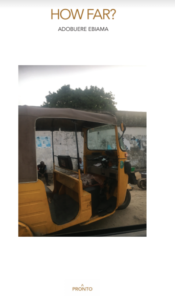 As the essays and poems progress, the titles seem to shroud you in more identity—you go from “The American” to “Queer” to “Black Woman,” as if you’re adding on layers of yourself. Was this intentional?
As the essays and poems progress, the titles seem to shroud you in more identity—you go from “The American” to “Queer” to “Black Woman,” as if you’re adding on layers of yourself. Was this intentional?
It was intentional for me to include all of the parts of myself that I felt were screaming for an audience during my trip—my queerness, being a black woman, being American etc. Being in a new place and especially feeling like the one sticking out like a sore thumb all the time, it was an exercise not to get wrapped up in how I was presenting myself.
I started the book with “The American” because it felt necessary to start the reader with an idea about my identity before the trip began in order to feel the contrast and similarities of what people think of me as a person of Nigerian descent in this country and also what it feels like to have the shoe on the other foot in Nigeria. They’re different lines of questioning but all probing about identity; “The American” is trying to catch up with the language and culture barriers, and then I come to the part in the book where “Queer” is—I kept thinking about the idea and safety of being “out” here in America and then in a country where I am meeting all of these people for the first time. I want to be accepted by them but I also want to be fully myself. Then, to think about gender roles and identity and the role of black women in family and societal structures is always something I think about, so that was also necessary to include in the book.
Honestly, it felt like all of the layers were happening simultaneously because I am a queer black American woman always. They mean different things but they are always in focus in a way. Putting the book together, I just had to find the best way that all of the pieces should be arranged, in terms of how they flowed together.
I loved the essay “Name.” I feel that many black Americans can relate to the experience of having their name pronounced wrongly and carelessly, especially the more “ethnic” it sounds, and the line, “disappointment shadows their faces when they come to find out how un-exotic I really am” just floored me. Can you tell me more about how you felt when your name was embraced with ease in Nigeria as opposed to here in America?
Without giving away too much of the piece here, I’ll just say it was a huge relief. It felt celebratory and exciting opposed to when people say it here in America. Here, it is often followed by apologies and then I’m there saying “no, it’s fine” or whatever and just having the same boring conversation with strangers over and over again. In Nigeria, I was not trapped into explaining what my name means because I just introduced myself and they knew! That was one of the best moments.
How Far? is set to be released before the end of this year! What’s next for you and your other artistic endeavors as we continue to face COVID19 concerns and the uncertain start of a new year?
Everything is so up in the air but my priority right now is to have a successful release of the book. Also, production companies have started opening up tv and film sets again so I would like to get back to my other passion—acting—very soon. I also wrote a short film that I would like to get produced by the end of this year as well, so we’ll see what I can make happen.
Keep an eye out for How Far? online and in bookstores this winter from Pronto. To learn more about Adobuere Ebiama, visit her site.
